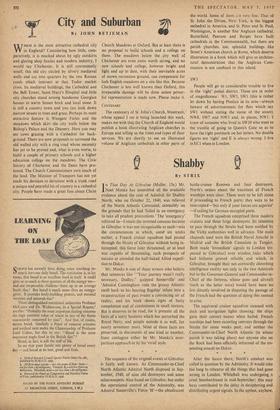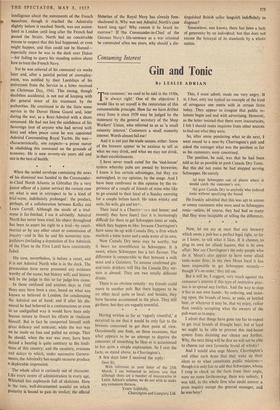Shabby
By STRIX Mr. Monks is one of those writers who believe that sentences like ' "Your journey wasn't really necessary, Dudley," quipped Somerville' and 'Admiral Cunningham rode the greasy Atlantic swell back to his heaving flagship' infuse into a reconstruction of past events a convincing air of reality; and his book shows signs of hasty compilation and of carelessness in small matters. But it deserves to be read, for it presents all the facts of a sorry business which has perturbed the Royal Navy, and people outside it as well, for nearly seventeen years. Most of these facts are preserved, in documents of one kind or another, from contagion either by Mr. Monks's over- partisan approach or by his 'vivid' style.
The sequence of the original events at Gibraltar is fairly well known. As Commander-in-Chief North Atlantic Admiral North disposed in Sep- tember, 1940, of nine old destroyers and some minesweepers. Also based on Gibraltar, but under the operational control of the Admiralty, was Admiral Somerville's FOrce 'H'—the obsolescent battle-cruiser Renown and four destroyers. North's orders about the treatment of French warships were clear. These were to be left alone if proceeding to French ports; they were to be intercepted—'but only if your forces are superior' —if sailing for German-occupied ports.
The French squadron comprised three modern cruisers and three large destroyers. Its intention to pass through the Straits had been notified by the Vichy authorities well in advance. The main channels used were the British Naval Attachd in Madrid and the British Consulate in Tangier. Both made 'Immediate' signals to London (re- peated to Gibraltar) over wireless _links which had hitherto proved reliable and which, in Gibraltar, brought their not outwardly disturbing intelligence swiftly not only to the two Admirals but to the Governor-General and Commander-in- Chief of the fortress, whose guns and aircraft (such as the latter were) would have been no less directly involved in disputing the passage of the French had the question of doing this seemed to arise.
The equivocal cruiser squadron steamed with deck and navigation lights showing; the ships gave their correct names when hailed. French warships had been escorting convoys through the Straits for some weeks past; and neither the Commander-in-Chief North Atlantic (in whose parish it was taking place) nor anyone else on the Rock had been officially informed of the im- pending assault on Dakar.
* * * After the fiasco there, North's conduct was called in question by the Admiralty. It would take too long to rehearse all the things that had gone wrong in London. Whitehall was undergoing a cruel bombardment in mid-September; this may have contributed to the delay in deciphering and distributing urgent signals. In the upshot, anyhow,
intelligence about the movements of the French squadron, though it reached the Admiralty slightly before it reached North, was not assimi- lated in London until long after the French had passed the Straits. North had no conceivable reason to suspect that this had happened, or even might happen, and thus could not be blamed— especially since he was in the dark over Pakar —for failing to query his standing orders about how to treat the French Navy.
Yet he was relieved of his command six weeks later and, after a painful period of unemploy- ment, was notified by their Lordships of his retirement from the Service in a letter received on Christmas Day, 1941. This timing, though doubtless accidental, is not out of keeping with the general tenor of his treatment by the authorities. He continued to do the State some service in the Dorset Home Guard and, later during the war, as a Rear-Admiral with a shore command. He had not lost the confidence of his Sovereign (nor of anyone who had served with him) and when peace came he was appointed Admiral Commanding Royal Yachts. He was— characteristically, one suspects—a prime mover in abolishing this command on the grounds of economy. He is now seventy-six years old and not in the best of health.
When the sealed envelope containing the news of his dismissal was handed to the Commander- in-Chief North Atlantic in Gibraltar (by a very junior officer of a junior service) the curtain rose on what is seen in retrospect to be a kind of trial-scene, indefinitely prolonged : the product, perhaps, of a collaboration between Kafka and • . Lewis Carroll. Although the simile of a trial- scene is far-fetched, I use it advisedly. Admiral North has never been tried; his object throughout has been to assert his right to a trial—by court- martial or by any other court or commission of inquiry—and in this he and his numerous sym- pathisers (including a deputation of five Admirals of the Fleet to the First Lord) have consistently failed.
His case, nevertheless, is before a court, and it is not Admiral North who is in the dock. The prosecution have never presented any evidence worthy of the name, but history will; and history will be the judge in this so far judge-less cause.
In those confused and anxious days in 1940 there may have been a ease, based on what was known or believed in London, for condemning the Admiral out of hand; and if after his dis- missal he had behaved in a contumacious or even in. an undignified way it would have been only human nature to thwart his efforts to vindicate himself. But in fact he comported himself with great delicacy and restraint; while the war was on he made no fuss and pulled no strings. That be should, when the war was over, have been denied a hearing is quite contrary to the tradi- tions of this country; and the casuistry, evasions and delays to which, under successive Govern- ments, the Admiralty has sought recourse produce n. deplorable impression.
The whole affair is curiously out of character. Like every centre of administration in every age, Whitehall has cupboards full of skeletons. Here is the rare, well-documented scandal on which posterity is bound to pass its verdict; the official historian of the Royal Navy has already fore- shadowed it. Why was not Admiral, North's case heard long ago? Why cannot it be heard to- morrow? If the Commander-in-Chief of the German Navy's life-sentence as a war criminal be commuted aften ten years, why should a dis- linguished British sailor languish indefinitely in disgrace?
Somewhere, one knows, there has been a lack of generosity by an individual; but that does not excuse the betrayal of its standards by a whole nation.











































 Previous page
Previous page